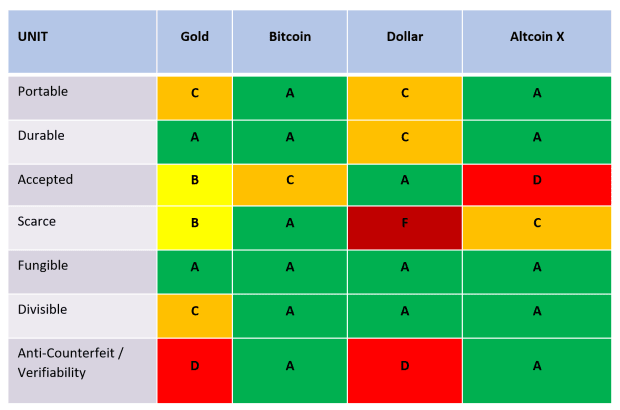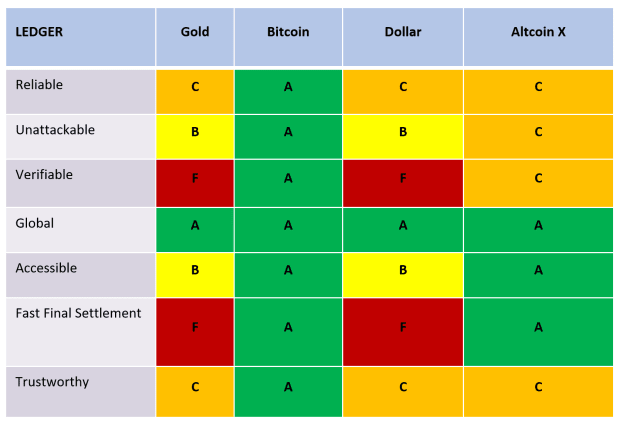Many of gold bugs’ values overlap with Bitcoin, but they dismiss BTC without understanding the superiority of its digital ledger.
This is an opinion editorial by Luke Groom, a civil engineer, JD-MBA student and part-time strategy associate with Marathon Digital Holdings.
In the last couple of years, Jordan Peterson has been diving down the sound money rabbit hole, and for me it’s been a pleasure to watch from a distance. So many of the values he espouses align with the values that Bitcoin encourages, such as personal responsibility and a search for truth, so it was only a matter of time before he became interested in Bitcoin.
He has spoken with Saefidean Ammous and Robert Breedlove in recent years and, even as a non-Bitcoiner per se, captivated the audience at the Bitcoin conference in Miami in 2022. A more recent conversation with Roy Sebag was also enjoyable to listen to, though it illustrated for me the need to discuss the differences between gold and bitcoin, not just their properties as monetary units, but also the properties of their ledgers.
To be sure, gold bugs such as Sebag and Peter Schiff share many beliefs with Bitcoiners. I respect them and their work. There is a lot of overlap in the problems and solutions that both gold bugs and Bitcoiners address. But the arguments for bitcoin as a superior unit of account have been discussed at length.
The Fact That Gold Has Other Tangible Uses Isn’t Relevant For Global Money
Sebag and Schiff argue that gold is valuable, in part, because it has other uses such as in cell phone parts and dentistry, whereas bitcoin has no other uses. This is true; however, I am not sure how this is relevant.
Why do we need our money to have other features besides just being money? Where is that written? If the monetary premium for gold disappeared, and it was only used for its other tangible purposes, gold’s price would utterly collapse. Furthermore, if gold became the global unit of account as gold bugs want it to, gold would be used even less for nonmonetary purposes due to cost limitations. Its monetary premium would increase, thereby weakening their own argument about having other valuable uses.
A monetary unit need only have good monetary properties and interact well with its ledger. As the generally accepted properties of money dictate, an ideal monetary unit would be portable, durable, accepted, scarce, fungible, divisible and resistant to counterfeiting.

As a unit, bitcoin is equal or superior to gold in all of these features, with the exception of acceptability. (Gold’s market cap is still roughly 20-times that of Bitcoin’s, meaning it is still more widely accepted.) Talking about the units, however, is only a fraction of the conversation. We must also look at the ledger.
The Bitcoin Ledger Is Superior
Our modern society requires the use of ledgers to transact money. Moving physical dollars or physical gold around the world is simply too costly, dangerous and logistically challenging. Instead, we rely on the ledgers of credit card companies, banks and central banks to facilitate the “movement” of money. Our whole system, except the relatively few physical dollars in existence, is a system of entirely ledger-based money.
Because ledgers have become necessary in modern commerce, and because no one is advocating a return to society in which all commerce is conducted exclusively by in-person exchanges of money, when analyzing monetary systems, we must not only look at the units on our ledgers but also the ledgers themselves. Bitcoin’s properties as a ledger are what make it a far superior monetary system to anything in existence.
If we were to think of the properties that make up an ideal ledger, they would be: reliable, unattackable, verifiable, global, accessible, trustworthy and able to provide fast final settlement. While the sound money properties of gold versus those of bitcoin were relatively close when considering the units behind the ledger, when comparing the ledgers themselves, Bitcoin is far superior.

From a monetary unit perspective, Bitcoiners and gold bugs agree that a gold-based system could encourage monetary responsibility and limit inflation. However, gold bugs have not provided any prevalent suggestions to improve the U.S. dollar ledger system. That current system is flawed in that it is unverifiable for individuals, inaccessible for individuals to interact with directly, and slow to process final settlement. How would a gold-based ledger be any better?
Furthermore, the gold bugs have not provided any meaningful suggestions about how to avoid the problems of debasement, which have been a constant for centuries.
We have already run the experiment of a gold-based ledger over the past 800 years. The Medici family popularized the ledger-based-gold-backed-banking in Italy and throughout Europe as early as the 12th and 13th centuries. Europeans, in effect, used ledgers to “transfer” their gold great distances. People and governments continued to use the system of overlapping ledgers backed by gold for centuries and each of those countries saw a corruption of the ledger, the failure of their currency or the debasement of gold. So, what mechanisms do gold bugs suggest to avoid the corruption and debasement of a gold-based ledger in the future? I have not heard any.
Bitcoin is beautiful in that it provides an elegant solution to both the unit and the ledger. The unit provides all of the characteristics of sound money and the ledger is reliable, unattackable, verifiable, global, accessible, provides fast final settlement and is trustworthy. An individual can personally interact with the ledger and provide verified final settlement across the globe in a matter of minutes on a ledger that doesn’t require a trusted intermediary.
I have a lot of respect for gold bugs, and even own a modest amount of gold myself. With that respect in mind, I ask Peterson, Sebag, Schiff and the other gold bugs, when comparing monetary systems, to analyze both the unit and the ledger, then come to their own conclusions.
This is a guest post by Luke Groom. Opinions expressed are entirely their own and do not necessarily reflect those of BTC Inc or Bitcoin Magazine.
Credit: Source link
































